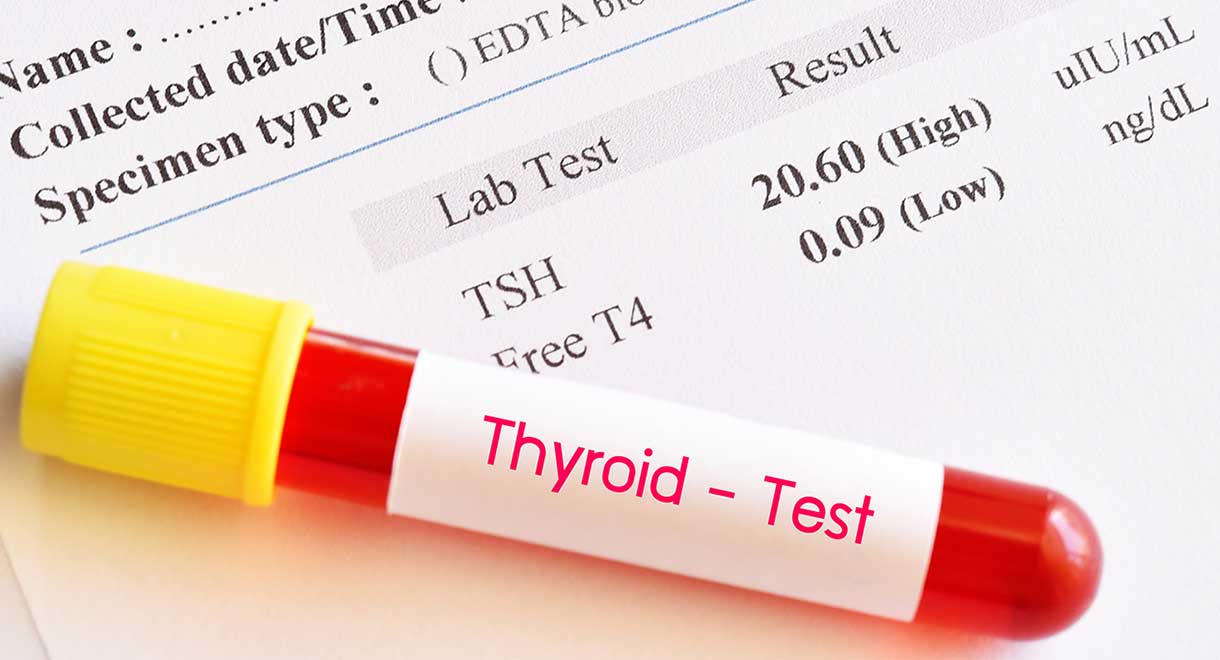How to read a thyroid blood test
By naturopath Margaret Jasinska
If you’ve ever had a thyroid blood test, you may have felt a little confused by the result. Having your thyroid checked via a blood test can give you a lot of information. It can detect if you have an overactive gland, an underactive gland or an autoimmune thyroid disease such as Hashimoto’s thyroiditis or Graves’ disease. Some thyroid conditions cannot be diagnosed via a blood test, these include thyroid nodules, thyroid cancer and an enlarged thyroid gland (goitre).
Your doctor may give you a basic thyroid test that only checks one hormone, or you may be given a thorough test. TSH stands for Thyroid Stimulating Hormone. It is made by the pituitary gland in your brain and instructs your thyroid to manufacture hormones. The two thyroid hormones are called T4 and T3.
The following are possible scenarios:
| Low TSH | overactive thyroid gland or too much thyroid hormone in a person who takes thyroxine or other thyroid hormone replacement medication. Rarely a low TSH level can mean the pituitary gland in the brain is not able to manufacture TSH. |
| High TSH | underactive thyroid gland that is not producing enough T4 and T3 in response to TSH stimulation. |
| Low T4 | underactive thyroid gland. This can be because the thyroid gland is not able to manufacture hormones, or because the pituitary gland is not stimulating the thyroid to make hormones. If you are currently taking thyroid hormone medication, this result means your dose is not high enough. |
| High T4 | overactive thyroid gland. If you are taking thyroid hormone medication this means your dose is too high. |
| Low T3 | underactive thyroid gland. Your body is not converting T4 into its active form (T3) adequately. |
| High T3 | overactive thyroid, or if you are taking thyroid hormone replacement, your dose is too high. |
The word euthyroid means that thyroid hormone levels are normal.
Thyroid antibody tests
Thyroid antibodies are tested in order to check for autoimmune thyroid disease like Hashimoto’s thyroiditis, Graves’ disease and postpartum thyroiditis. This is an important test to have because most thyroid disorders in the world are autoimmune. This test can also pick up a problem in the early stages, before it develops into a hormone deficiency or excess. Your thyroid function test results may be normal but if you have thyroid antibodies in your bloodstream, your immune system is destroying your thyroid gland and sooner or later your hormone levels will probably be abnormal too.
A thyroid antibody test consists of:
| Anti-thyroglobulin Antibody (TgAb) | Cut off titre = 100 |
| Anti-microsomal Antibody Ab (TPOAb) (This antibody is also called thyroid peroxidase). |
Cut off titre = 100 |
A result above 100 means that your immune system is producing sufficient antibodies to attack and destroy your thyroid gland. This is referred to as Hashimoto’s thyroiditis. (Please note that some labs use a different testing method and therefore the reference range is different).
TSH receptor antibodies (TRAb)
These can make the thyroid gland overactive and are found in Graves’ disease.
For all types of antibodies, usually the higher the antibody levels, the more severe the disease. Higher antibodies are also associated with flareups of the disease.

Who should have a blood test for thyroid disease?
Having a blood test for your thyroid gland is an important part of maintaining your health. According to the American Thyroid Association, everyone should have their thyroid gland function tested at age 35 and every five years then on.
If you fall into one of the categories below, you should have a complete thyroid function test (TSH, T4 & T3) as well as a thyroid antibody test at least every five years:
- Women over the age of 35 years.
- Anyone with a family history of thyroid disease.
- Anyone who has previously suffered with a thyroid condition, such as postpartum thyroiditis.
- Anyone with an autoimmune disease, such as type 1 diabetes, rheumatoid arthritis, lupus or other.
- People with a family history of autoimmune disease.
- People with coeliac disease.
- Anyone who gains weight easily and struggles to lose it.
- If you have lost weight unexpectedly.
- Anyone experiencing fatigue and lethargy.
- People with depression.
- Anyone who suffers with infertility.
- People who are taking lithium or amiodarone, as these medications are known to affect the thyroid gland.
- Anyone who has received radiation to the neck or chest area.
- If you currently take thyroid hormone medication you should have a blood test every six months for TSH, T4 and T3.
The best time to have a blood test
If you have just started taking thyroid hormone medication, you should have a blood test for your TSH, free T4 and free T3 six weeks after commencement. Any time that your dose of medication is adjusted, you should have a blood test six weeks later.
Have the blood test done first thing in the morning and do not take your usual morning dose of medication that day, until after blood sample has been taken. This allows your lowest hormone levels over a 24 hour period to be measured. If you are feeling well on your thyroid medication, you should have a complete thyroid function test every six months.
Biotin supplements can interfere with thyroid blood tests
If you are taking a supplement that contains biotin, discontinue it for 3 days before having a thyroid hormone blood test. This is because biotin can give a false reading when testing for TSH, T4, T3 and parathyroid hormone.
Selenium assists with thyroid hormone production. Thyroid Health capsules contain nutrients to support healthy thyroid gland function. For more information about thyroid conditions see our book Your Thyroid Problems Solved.









if your blood tests are well within normal limits does that mean your liver is ok or can you still have fatty liver problems ??
Hi Julie,
What symptoms are you experiencing that you think could be related to a fatty liver?
Generally speaking, when you have a fatty liver you will have raised liver enzymes.
i was given blood tests n scans , the gastrologist said i have a bad fatty liver go see a dietician . that was about 4 or so months ago had blood tests again , got the results last week my liver function is within normal limits but i gather that blood tests dont give a total answer i could still have a fatty liver
Hi Julie,
That’s great that your liver enzymes have come down. You would need another abdominal ultrasound to determine whether or not you still have a fatty liver – it could be mild.
If you stick to the dietary principles in Dr Cabot’s book Fatty Liver You Can Reverse it on a long term basis hopefully you won’t have issues with a fatty liver in the future
Hello, just an enquiry as to wether I have a thyroid issue and need treatment thru your clinic.
My TSH 1.16
Free T4 14.4
Free T 3 3.9
GGT H42
eGFR L58
and have a fast pulse rate and irregular.
Please advise if I need to have treatment. I gave been seeing Beverely at your clinic in past.
Hi Branka,
Your T3 is lower than ideal. This is probably because your liver is inflamed and not producing it properly.
Your kidney function is sub optimal. It would be good to have a urine test called a urea creatinine ratio.
If you would like to book a consultation with someone you can contact our clinic: info@cabotclinics.com.au or 02 4655 4666.
kind regards,
Margaret